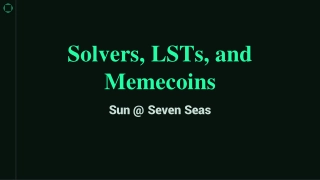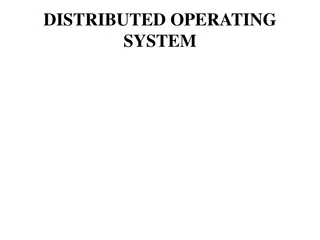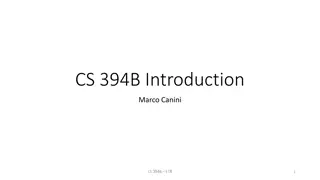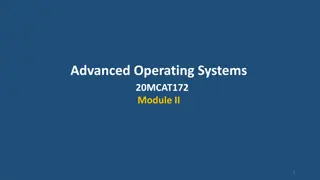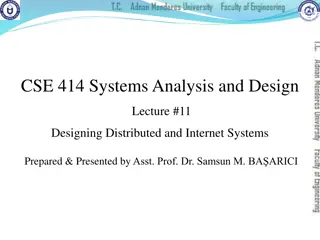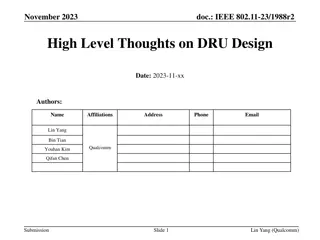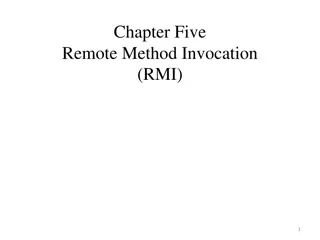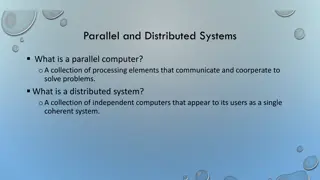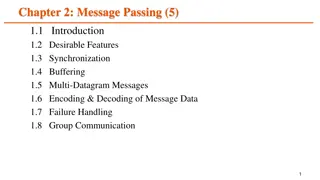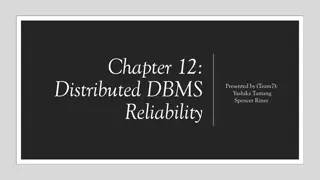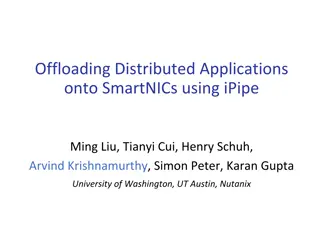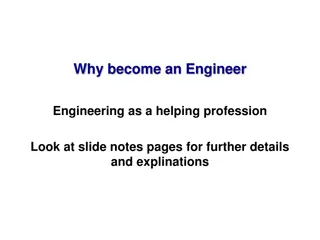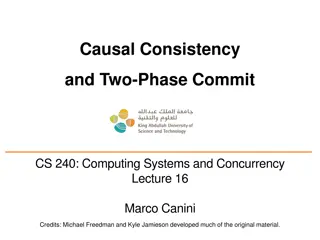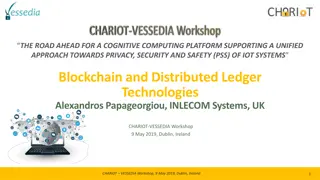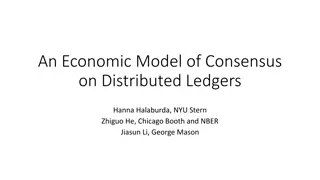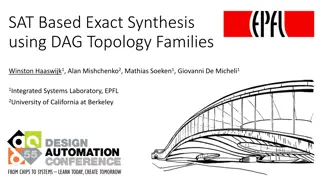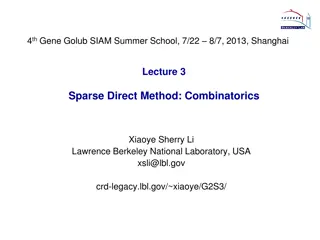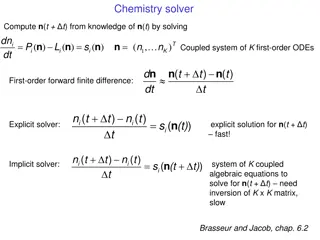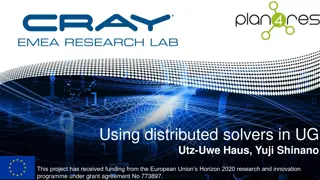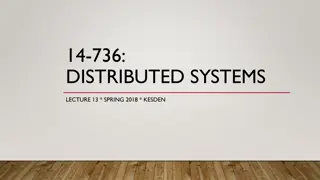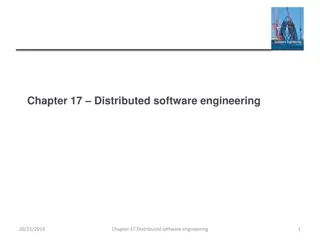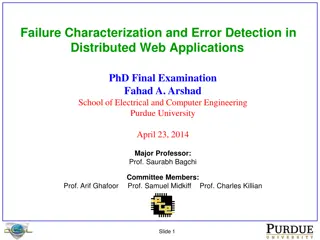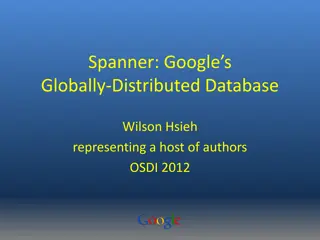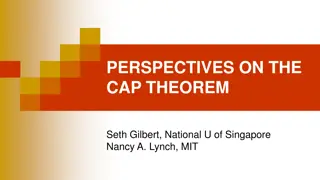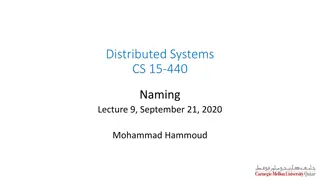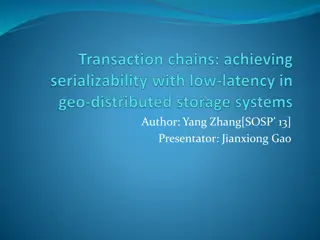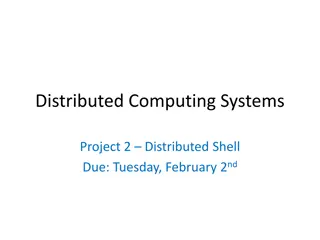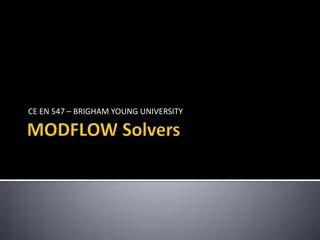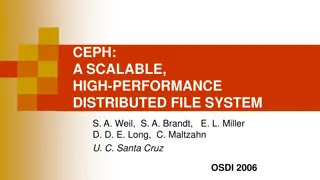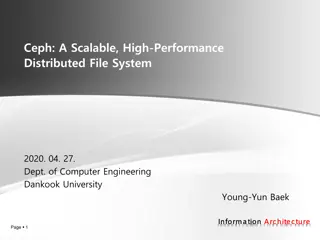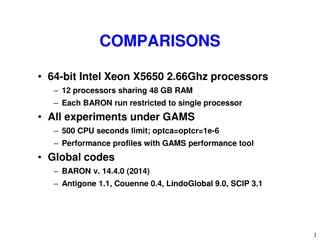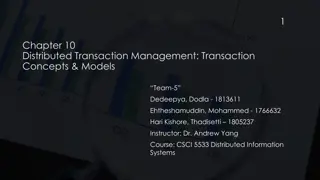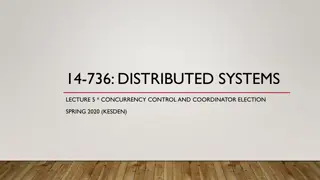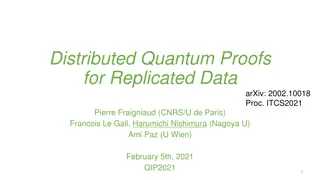Understanding Solvers and Memecoins in the Seven Seas Ecosystem
Explore the role of solvers, LSTs, and memecoins in the Seven Seas ecosystem, where strategists develop smart contracts and innovative strategies to enhance user experience and optimize trading processes. Learn about the Sommelier architecture and the significance of CEX-DEX arbitrage in the crypto
0 views • 14 slides
Overview of Distributed Systems: Characteristics, Classification, Computation, Communication, and Fault Models
Characterizing Distributed Systems: Multiple autonomous computers with CPUs, memory, storage, and I/O paths, interconnected geographically, shared state, global invariants. Classifying Distributed Systems: Based on synchrony, communication medium, fault models like crash and Byzantine failures. Comp
9 views • 126 slides
Overview of Distributed Operating Systems
Distributed Operating Systems (DOS) manage computer resources and provide users with convenient interfaces. Unlike centralized systems, DOS runs on multiple independent CPUs and prioritizes software over hardware. It ensures transparency and fault tolerance, with a focus on software error handling.
1 views • 36 slides
Understanding CS 394B: Blockchain Systems and Distributed Consensus
This course, led by Assistant Professor Marco Canini, delves into the technical aspects of blockchain technologies, distributed consensus, and secure software engineering. Students will engage in flipped classroom-style classes and paper presentations, critiquing research papers, defending research
0 views • 65 slides
Understanding Distributed Mutual Exclusion in Operating Systems
In distributed systems, the problem of mutual exclusion arises when multiple sites/processes need to access shared resources concurrently. Unlike in single-computer systems, distributed systems lack shared memory, leading to the need for communication-based approaches rather than shared variables li
0 views • 49 slides
Understanding Parallel and Distributed Computing Systems
In parallel computing, processing elements collaborate to solve problems, while distributed systems appear as a single coherent system to users, made up of independent computers. Contemporary computing systems like mobile devices, IoT devices, and high-end gaming computers incorporate parallel and d
1 views • 11 slides
Designing Distributed and Internet Systems
Learn about the design considerations for distributed and internet systems, including file server versus client/server environments, cloud computing trends, internet standards, and system development life cycle. Explore designing systems for local area networks (LANs) and the process of creating dis
2 views • 51 slides
High-Level Thoughts on Distributed Tone Resource Unit (dRU) Design in IEEE 802.11-23/1988r2 November 2023
Various aspects of Distributed Tone Resource Unit (dRU) design in IEEE 802.11-23/1988r2, such as PSD limitations, distributed transmission regulations, application areas, and open questions are discussed in this presentation by Lin Yang from Qualcomm. Topics include tone distribution, power pooling
0 views • 19 slides
Understanding Remote Method Invocation (RMI) in Distributed Systems
A distributed system involves software components on different computers communicating through message passing to achieve common goals. Organized with middleware like RMI, it allows for interactions across heterogeneous networks. RMI facilitates building distributed Java systems by enabling method i
1 views • 47 slides
Understanding Remote Method Invocation (RMI) in Distributed Systems
A distributed system involves components on different computers communicating to achieve a common goal. Middleware, like RMI, helps organize these systems. RMI allows Java objects to invoke methods on remote objects, facilitating distributed Java systems. It differs from RPC by focusing on object-or
1 views • 47 slides
Understanding Parallel and Distributed Systems in Computing
A parallel computer is a collection of processing elements that collaborate to solve problems, while a distributed system comprises independent computers appearing as a single system. Contemporary computing systems, like mobile devices and cloud platforms, utilize parallel and distributed architectu
0 views • 11 slides
Understanding Message Passing in Distributed Systems
Explore the key concepts of message passing in distributed systems, covering inter-process communication, desirable features like simplicity, efficiency, and reliability, different methods for information sharing, and the importance of synchronization and buffering. Dive into the intricacies of enco
0 views • 68 slides
Distributed DBMS Reliability Concepts and Measures
Distributed DBMS reliability is crucial for ensuring continuous user request processing despite system failures. This chapter delves into fundamental definitions, fault classifications, and types of faults like hard and soft failures in distributed systems. Understanding reliability concepts helps i
0 views • 58 slides
SmartNIC Offloading for Distributed Applications
This presentation discusses offloading distributed applications onto SmartNICs using the iPipe framework. It explores the potential of programmable NICs to accelerate general distributed applications, characterizes multicore SmartNICs, and outlines the development and evaluation process. The study c
0 views • 31 slides
Comprehensive Overview of Numerical Linear Algebra Methods for Solving Linear Systems
Explore numerical linear algebra techniques for solving linear systems of equations, including direct and iterative methods. Delve into topics like Gaussian elimination, LU factorization, band solvers, sparse solvers, iterative techniques, and more. Gain insights into basic iterative methods, error
6 views • 12 slides
Exploring the Role of Engineers as Problem Solvers in Society
Engineers play a vital role in solving complex problems and shaping the future. They are creative problem-solvers who have the potential to make significant contributions to various industries. Engineering offers not only job security and financial stability but also the opportunity to work with tal
0 views • 10 slides
Understanding Causal Consistency in Distributed Systems
This content covers the concept of causal consistency in computing systems, exploring consistency models such as Causal Linearizability and Eventual Sequential. It explains the importance of logical clocks like Lamport and vector clocks, and how they ensure order in distributed systems. The concept
0 views • 35 slides
Enhancing IoT Systems with Blockchain and Distributed Ledger Technologies
Explore the potential of blockchain and distributed ledger technologies in enhancing IoT systems, focusing on privacy, security, and safety. The workshop discusses the benefits and challenges of implementing DLT, as well as a reference IoT scenario in the manufacturing industry. Discover how DLT ena
0 views • 16 slides
Economic Models of Consensus on Distributed Ledgers in Blockchain Technology
This study delves into Byzantine Fault Tolerance (BFT) protocols in the realm of distributed ledgers, exploring the complexities of achieving consensus in trusted adversarial environments. The research examines the classic problem in computer science where distributed nodes communicate to reach agre
0 views • 34 slides
Distributed Algorithms for Leader Election in Anonymous Systems
Distributed algorithms play a crucial role in leader election within anonymous systems where nodes lack unique identifiers. The content discusses the challenges and impossibility results of deterministic leader election in such systems. It explains synchronous and asynchronous distributed algorithms
2 views • 11 slides
SAT-Based Exact Synthesis Using DAG Topology Families
Explore the world of exact synthesis in digital circuit design utilizing SAT solvers to achieve precise results. Understand the challenges, decision problems, algorithms, motivation behind exact synthesis, and the contribution of SAT solvers in mitigating runtime. Discover the concept of DAG topolog
0 views • 17 slides
Overview of Sparse Linear Solvers and Gaussian Elimination
Exploring Sparse Linear Solvers and Gaussian Elimination methods in solving systems of linear equations, emphasizing strategies, numerical stability considerations, and the unique approach of Sparse Gaussian Elimination. Topics include iterative and direct methods, factorization, matrix-vector multi
0 views • 35 slides
Chemical Kinetics and Numerical Solvers in Chemistry
Explore the principles of chemical kinetics and the use of numerical solvers to compute concentrations over time, considering explicit and implicit methods. Understand stability and positivity requirements in solvers and the importance of characteristic time scales in chemical systems. Dive into a s
0 views • 5 slides
Exploring Distributed Solvers for Scalable Computing in UG
This project discusses the use of distributed solvers in UG to enable multi-rank MPI-based solvers with varying sizes, addressing the need for scalable solver codes and dynamic resource allocation. It introduces the UG solver interface, revisits the Concorde solver for TSP problems, and explores run
0 views • 14 slides
Overview of Distributed Systems, RAID, Lustre, MogileFS, and HDFS
Distributed systems encompass a range of technologies aimed at improving storage efficiency and reliability. This includes RAID (Redundant Array of Inexpensive Disks) strategies such as RAID levels, Lustre Linux Cluster for high-performance clusters, MogileFS for fast content delivery, and HDFS (Had
0 views • 23 slides
Distributed Software Engineering Overview
Distributed software engineering plays a crucial role in modern enterprise computing systems where large computer-based systems are distributed over multiple computers for improved performance, fault tolerance, and scalability. This involves resource sharing, openness, concurrency, and fault toleran
0 views • 66 slides
Challenges in Detecting and Characterizing Failures in Distributed Web Applications
The final examination presented by Fahad A. Arshad at Purdue University in 2014 delves into the complexities of failure characterization and error detection in distributed web applications. The presentation highlights the reasons behind failures, such as limited testing and high developer turnover r
0 views • 53 slides
Google Spanner: A Distributed Multiversion Database Overview
Represented at OSDI 2012 by Wilson Hsieh, Google Spanner is a globally distributed database system that offers general-purpose transactions and SQL query support. It features lock-free distributed read transactions, ensuring external consistency of distributed transactions. Spanner enables property
0 views • 27 slides
Understanding the CAP Theorem in Distributed Systems
The CAP Theorem, as discussed by Seth Gilbert and Nancy A. Lynch, highlights the tradeoffs between Consistency, Availability, and Partition Tolerance in distributed systems. It explains how a distributed service cannot provide all three aspects simultaneously, leading to practical compromises and re
0 views • 28 slides
Understanding Distributed Hash Table (DHT) in Distributed Systems
In this lecture, Mohammad Hammoud discusses the concept of Distributed Hash Tables (DHT) in distributed systems, focusing on key aspects such as classes of naming, Chord DHT, node entities, key resolution algorithms, and the key resolution process in Chord. The session covers various components of D
0 views • 35 slides
Distributed Database Management and Transactions Overview
Explore the world of distributed database management and transactions with a focus on topics such as geo-distributed nature, replication, isolation among transactions, transaction recovery, and low-latency maintenance. Understand concepts like serializability, hops, and sequence number vectors in ma
0 views • 17 slides
Distributed Computing Systems Project: Distributed Shell Implementation
Explore the concept of a Distributed Shell in the realm of distributed computing systems, where commands can be executed on remote machines with results returned to users. The project involves building a client-server setup for a Distributed Shell, incorporating functionalities like authentication,
0 views • 14 slides
Analysis of Branching Heuristics in SAT Solvers
This content delves into various branching heuristics used in SAT solvers, such as Exponential Recency Weighted Average, Conflict History-Based, and Tie-break of VSIDS. It discusses the decision-making processes of solvers and compares different approaches to handle ties and improve solver performan
0 views • 16 slides
Understanding Iterative Solvers in MODFLOW
In this content, you will learn about the working of iterative solvers, solver parameters, troubleshooting convergence issues, and various solver algorithms in MODFLOW. The iterative tweaking of starting head values, different solver codes like SIP, PCG2, GMG, and their characteristics are explained
0 views • 21 slides
Overview of Ceph Distributed File System
Ceph is a scalable, high-performance distributed file system designed for excellent performance, reliability, and scalability in very large systems. It employs innovative strategies like distributed dynamic metadata management, pseudo-random data distribution, and decoupling data and metadata tasks
0 views • 42 slides
Overview of Ceph: A Scalable Distributed File System
Ceph is a high-performance distributed file system known for its excellent performance, reliability, and scalability. It decouples metadata and data operations, leverages OSD intelligence for complexity distribution, and utilizes adaptive metadata cluster architecture. Ceph ensures the separation of
0 views • 23 slides
Performance Comparison of Optimization Solvers on Intel Xeon X5650 Processors
Experiment results comparing the performance of optimization solvers (BARON, Antigone, LindoGlobal, SCIP, Couenne) on Intel Xeon X5650 2.66Ghz processors with 48GB RAM. The study includes 369 NLPs from various libraries and an aggregate analysis of 1740 NLPs and MINLPs. Performance profiles generate
0 views • 6 slides
Distributed Transaction Management in CSCI 5533 Course
Exploring transaction concepts and models in distributed systems, Team 5 comprising Dedeepya, Dodla, Ehtheshamuddin, and Hari Kishore under the guidance of Dr. Andrew Yang delve into the intricacies of distributed transaction management in CSCI 5533 Distributed Information Systems.
0 views • 56 slides
Concurrency Control and Coordinator Election in Distributed Systems
This content delves into the key concepts of concurrency control and coordinator election in distributed systems. It covers classical concurrency control mechanisms like Semaphores, Mutexes, and Monitors, and explores the challenges and goals of distributed mutual exclusion. Various approaches such
0 views • 48 slides
Quantum Distributed Proofs for Replicated Data
This research explores Quantum Distributed Computing protocols for tasks like leader election, Byzantine agreement, and more. It introduces Quantum dMA protocols for verifying equality of replicated data on a network without shared randomness. The study discusses the need for efficient protocols wit
0 views • 28 slides
